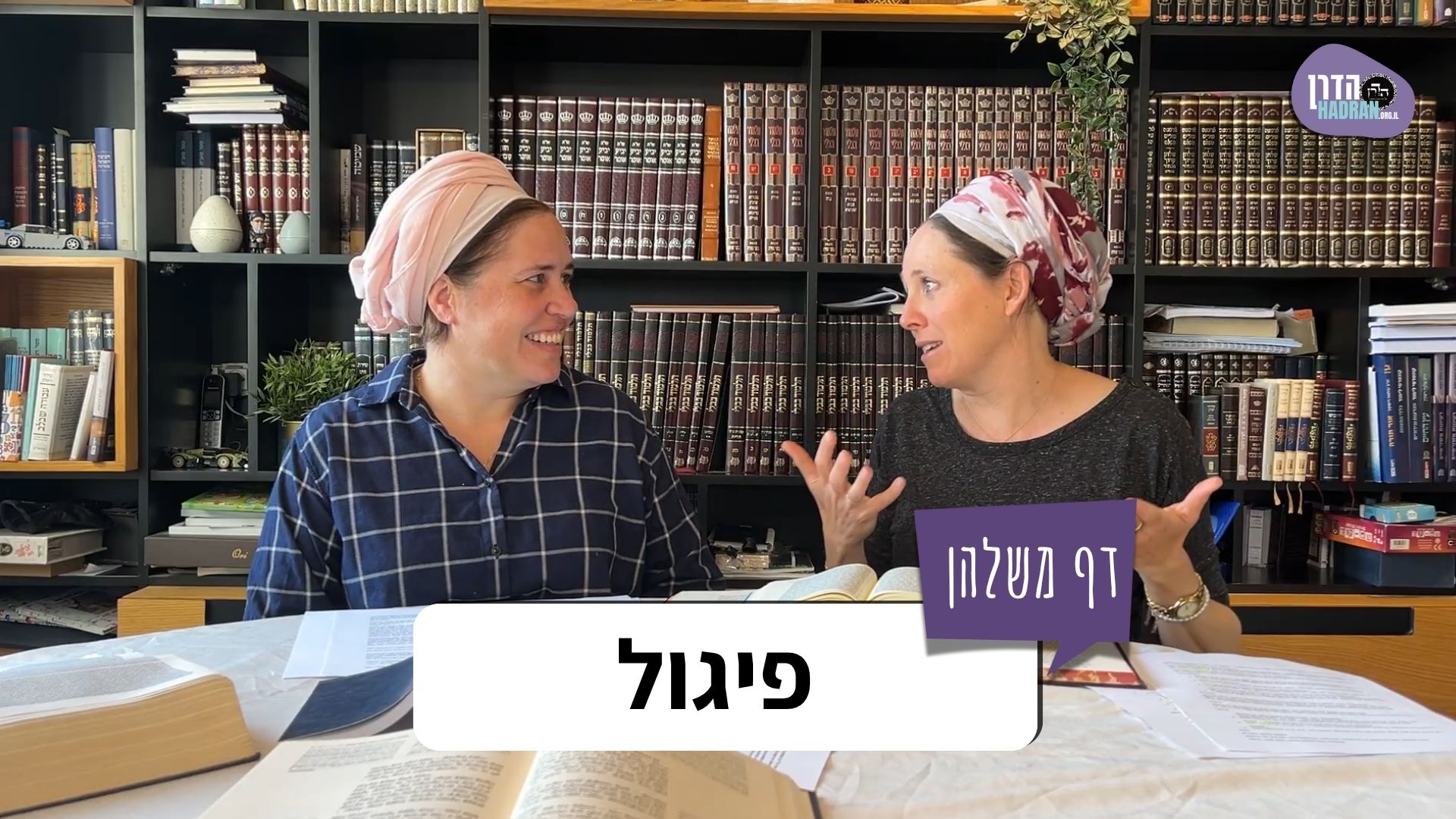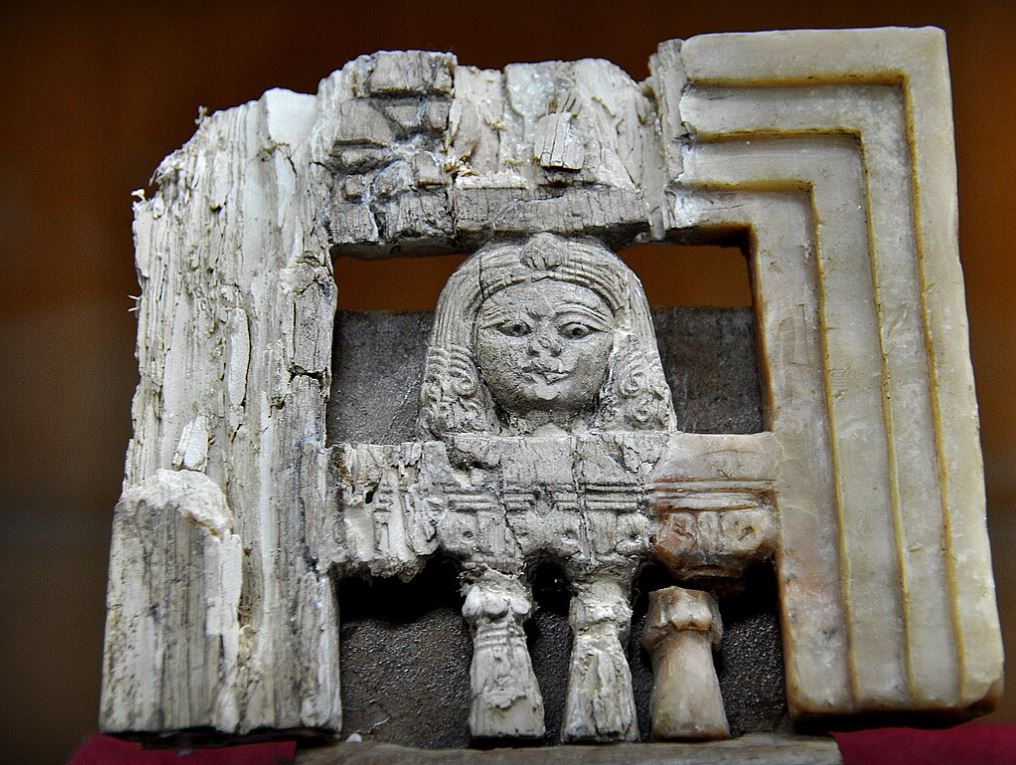Study Guide Nedarim 68
Nedarim 67
Share this shiur:
This month’s learning is sponsored by Beth Balkany in honor of their granddaughter, Devorah Chana Serach Eichel. “May she grow up to be a lifelong learner.”
Want to dedicate learning? Get started here:

This month’s learning is sponsored by Beth Balkany in honor of their granddaughter, Devorah Chana Serach Eichel. “May she grow up to be a lifelong learner.”
Delve Deeper
Broaden your understanding of the topics on this daf with classes and podcasts from top women Talmud scholars.
New to Talmud?
Check out our resources designed to help you navigate a page of Talmud – and study at the pace, level and style that fits you.
The Hadran Women’s Tapestry
Meet the diverse women learning Gemara at Hadran and hear their stories.
Nedarim 67
הֵפֵר הָאָב וְלֹא הֵפֵר הַבַּעַל, הֵפֵר הַבַּעַל וְלֹא הֵפֵר הָאָב — אֵינוֹ מוּפָר. וְאֵין צָרִיךְ לוֹמַר שֶׁקִּיֵּים אֶחָד מֵהֶן.
If the father nullified her vow and the husband did not nullify it, or if the husband nullified it and the father did not nullify it, then the vow is not nullified. And needless to say, it is not nullified if one of them ratified the vow.
גְּמָ׳ הַיְינוּ רֵישָׁא: אָבִיהָ וּבַעְלָהּ מְפִירִין נְדָרֶיהָ! מַהוּ דְּתֵימָא: אוֹ אָבִיהָ אוֹ בַעְלָהּ קָתָנֵי, קָא מַשְׁמַע לַן.
GEMARA: The mishna states that if the father nullified her vow and the husband did not nullify it, or if the husband nullified it and the father did not nullify it, then the vow is not nullified. The Gemara asks: Is this not the same as the first clause of the mishna, which states: Her father and her husband nullify her vows? The Gemara answers: The second clause is necessary, lest you say: The mishna is teaching that either her father or her husband can nullify her vows, but there is no need for both of them to do so, which is also a possible interpretation of the Hebrew phrase used. Therefore, the mishna teaches us that it means that both of them must nullify the vow.
וְאֵין צָרִיךְ לוֹמַר שֶׁקִּיֵּים אֶחָד מֵהֶן. לְמָה לִי לְמִיתְנָא? הַשְׁתָּא יֵשׁ לוֹמַר הֵפֵר זֶה בְּלֹא זֶה — וְלֹא כְּלוּם, קִיֵּים אֶחָד מֵהֶן לְמָה לִי? צְרִיכָא לְמִיתְנֵי?!
At the end of the mishna it is stated: And needless to say, it is not nullified if one of them ratified the vow. The Gemara asks: Why do I need the mishna to teach this? Now, it was stated that if one of them nullified the vow without the other, it is nothing, her vow is not nullified. If one of them ratified it, why do I need it to state that her vow is not nullified? Is it necessary to teach this?
כִּי אִיצְטְרִיךְ לֵיהּ כְּגוֹן דְּהֵפֵר אֶחָד מֵהֶן וְקִיֵּים אֶחָד, וְחָזַר הַמְקַיֵּים וְנִשְׁאַל עַל הֲקָמָתוֹ. מַהוּ דְּתֵימָא: מַאי דְּאוֹקִי הָא עַקְרֵיהּ, קָא מַשְׁמַע לַן דִּמְפִירִין שְׁנֵיהֶם בְּבַת אַחַת.
The Gemara answers: It was necessary for the mishna to mention this in a case where one of them nullified the vow and the other one ratified it, and the one who ratified the woman’s vow retracted and requested dissolution of his ratification from a halakhic authority, who dissolved it. Lest you say: That which he ratified is what he uprooted, by asking the halakhic authority to dissolve his ratification, and therefore the vow is no more, the mishna teaches us that they both must nullify it together.
וְנַעֲרָה הַמְאוֹרָסָה אָבִיהָ וּבַעְלָהּ מְפִירִין נְדָרֶיהָ, מְנָלַן? אָמַר רַבָּה, אָמַר קְרָא: ״וְאִם הָיוֹ תִהְיֶה לְאִישׁ וּנְדָרֶיהָ עָלֶיהָ״. מִכָּאן לְנַעֲרָה הַמְאוֹרָסָה שֶׁאָבִיהָ וּבַעְלָהּ מְפִירִין נְדָרֶיהָ. אֵימָא הַאי קְרָא בִּנְשׂוּאָה כְּתִיב!
§ The mishna teaches: And with regard to a betrothed young woman, her father and her husband nullify her vows. The Gemara asks: From where do we derive this halakha? Since she is still in her father’s house, he should be authorized to nullify her vows by himself. Rabba said: The verse states: “And if she be to a husband, and her vows are upon her…But if her husband disallows her on the day that he hears it” (Numbers 30:7–9). From here can be derived with regard to a betrothed young woman that her father and her husband nullify her vows. The Gemara asks: Is it not possible to say that this verse is written with regard to a married woman?
אִי מִשּׁוּם נְשׂוּאָה, קְרָא אַחֲרִינָא כְּתִיב: ״וְאִם בֵּית אִישָׁהּ נָדָרָה״. אֵימָא תַּרְוַיְיהוּ בִּנְשׂוּאָה?! וְכִי תֵּימָא תְּרֵי קְרָאֵי בִּנְשׂוּאָה לְמָה לִי — לְמֵימַר שֶׁאֵין הַבַּעַל מֵיפֵר בְּקוֹדְמִין.
The Gemara answers: No, if you say that it is written due to a need to teach the halakha of a married woman, it cannot be, as a different verse is written for that purpose: “And if a woman vowed in her husband’s house” (Numbers 30:11). The earlier verses therefore refer to a betrothed young woman, who is not yet in her husband’s house. The Gemara suggests: Say that both sets of verses are written with regard to a married woman. And if you would say: Why do I need two verses written with regard to a married woman? It is to say that the husband cannot nullify earlier vows made before her marriage but only those made “in her husband’s house.”
וְלָאו מִמֵּילָא שָׁמְעַתְּ מִינַּהּ?
The Gemara rejects this, stating: And do you not learn it by itself, from the words “And if she vowed in her husband’s house” (Numbers 30:11)? As the verse indicates that her husband can nullify only vows made after the couple is fully married, and not those made beforehand, the earlier verse is unnecessary.
אִיבָּעֵית אֵימָא, דַּהֲוָיָה קִדּוּשִׁין מַשְׁמַע.
The Gemara suggests an alternative method of demonstrating that the first verse is referring to a betrothed woman: Or if you wish, say that the words “and if she be to a husband” (Numbers 30:7) must be referring to a betrothed woman, since the usage of the term “she be” indicates betrothal rather than marriage.
אֵימָא אָב לְחוֹדֵיהּ מֵיפֵר! אִם כֵּן ״וְאָסְרָה אִסָּר בֵּית אָבִיהָ״, ״יָנִיא אוֹתָהּ״ לְמָה לִי? הַשְׁתָּא יֵשׁ לוֹמַר בִּמְקוֹם אָרוּס מֵיפֵר אָב לְחוֹדֵיהּ, שֶׁלֹּא בִּמְקוֹם אָרוּס, מִיבַּעְיָא?
The Gemara proposes: Say that a father can nullify the vows of his betrothed daughter on his own. The Gemara responds: If so, why do I need the verse to teach that in a case where she binds herself with a bond in her father’s house, her father can disallow her, i.e., nullify her vow (see Numbers 30:4–6). Now when it can be said that in the presence of a betrothed, i.e., when she is betrothed, the father nullifies his daughter’s vows on his own, is it necessary to state that he can do so where there is no betrothed? Therefore, the fact that the Torah specifically states that the father nullifies her vows by himself when she is not betrothed indicates that he does not have that power when she is betrothed.
אֵימָא אָב לִיבְעֵי אָרוּס, וְאָרוּס לְחוֹדֵיהּ מֵיפֵר. וְכִי תֵּימָא: אָב דִּכְתַב רַחֲמָנָא לְמָה לִי, מִיבְּעֵי לֵיהּ דְּאִי הֵקִים — הֵקִים!
The Gemara suggests: Say that the father requires the betrothed’s participation in order to nullify his daughter’s vows but that the betrothed can nullify them on his own. And if you would say: If the woman’s betrothed can nullify them on his own, why do I need the reference to the father that the Merciful One writes with regard to the vows of a betrothed young woman, implying that the participation of the father is necessary to nullify her vows. One can explain that the need to mention the father is necessary in order to teach us that if the father ratified the vow, it is ratified, and her betrothed can no longer nullify it.
אִם כֵּן, ״בֵּית אִישָׁהּ נָדָרָה״ לְמַאי כְּתִב? קַל וָחוֹמֶר: וּמָה בִּמְקוֹם אָב אָרוּס מֵיפֵר לְחוֹדֵיהּ, שֶׁלֹּא בִּמְקוֹם אָב מִיבַּעְיָא?!
The Gemara rejects this suggestion: If so, for what purpose did the Torah write “And if she vowed in her husband’s house” (Numbers 30:11), which indicates that a married woman’s husband nullifies her vows on his own? That could be derived by an a fortiori inference: If in the presence of the father, a betrothed man nevertheless nullifies her vows on his own, then when she is no longer in the presence of the father, i.e., she is married and no longer subject to his authority, is it necessary to state that her husband nullifies her vows on his own?
אֵימָא: ״אִם בֵּית אִישָׁהּ נָדָרָה״, לוֹמַר שֶׁאֵין הַבַּעַל מֵיפֵר בְּקוֹדְמִין!
The Gemara suggests: Say that the betrothed can nullify her vows by himself, and the words “And if she vowed in her husband’s house” (Numbers 30:11) are in fact not necessary to teach that a fully married husband can nullify her vows on his own. Rather, they come to say, i.e., to teach, that the husband cannot nullify vows that preceded the betrothal.
וּמִינֵּיהּ, אָרוּס מֵיפֵר בְּקוֹדְמִין.
The Gemara answers: But from that, i.e., from the fact that the verse precludes only the full-fledged husband from nullifying vows that preceded the betrothal, one may infer that the betrothed can nullify by himself vows that preceded the betrothal. Such a conclusion is unreasonable, as the fully married man has greater authority over her than the betrothed.
אֶלָּא לָאו מִשּׁוּם שׁוּתָּפוּתֵיהּ דְּאָב.
Rather, is it not the case that the betrothed cannot nullify vows on his own, and his ability to do so is only because of his partnership with the father?































